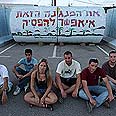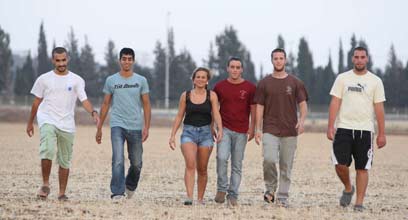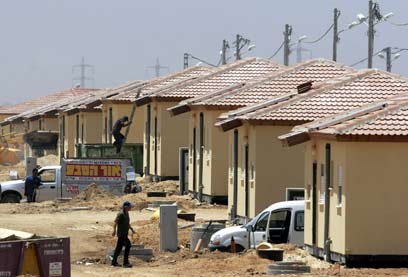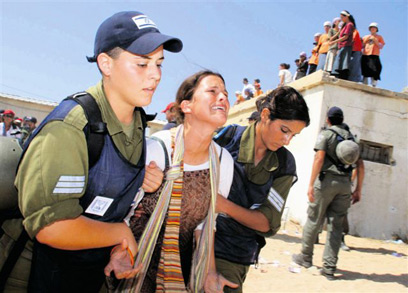
The children of summer 2005
They grew up in Gush Katif, between sand and sea, where doors were kept unlocked because there were no thieves. But then came disengagement along with feelings of betrayal and anger. Today, after many deliberations, they are about to join army. Only one of them still has his doubts. 'I used to admire soldiers,' he says. 'Now I can't even offer them a ride'
The temporariness has become permanence here. The containers are everywhere, as are the huge concrete pipes used as shelter against rockets fired from Gaza.
We met at the youth club near the pizzeria. As you enter the community you take a right, and then immediately, just across from the kiosk, a left. Like any other structure here, it's an expanded caravilla. A ping-pong table, a pool table, two flat screens with a game consul attached to one of them, and two teenage boys competing in a football game.
At the nearby basketball court, children are playing. At 8:30, a mini-football tournament will begin at the local youth cultural center. Another steamy summer in the caravillas.
The new recruits began arriving at the club. They were 13 during the evacuation from Gush Katif, where they were born, raised and uprooted from that summer.
Five years have passed, and now they are about to don uniform. It wasn't obvious, they say. Each of them has gone some distance with himself. Self-work, work with the community, with the family, friends, teachers. A road which began with complete isolation, with a feeling of reject and lack of belonging, and ends now with a great desire, by almost all of them, to belong again, to enlist and contribute.

In Nitzan. 'The State simply abandoned us' (Photo: Gadi Kabalo)
Ram Idel, who was one year old when his parents moved to Nisanit, deliberated and eventually decided to enlist. Liz Or, who grew up in Nisanit, on the beach which she misses so much, considered giving up on her military service, but decided to put her anger aside.
Shmuel Wexler, who was born in Neve Dekalim, had no doubts. It was clear to him that he would enlist. Nir Abitbul and Naor Konky, also from Neve Dekalim, went through a long process and can’t wait to be drafted.
"Look at where we are today and where we were five years ago," says Naor. "What a difference."
But Zuriel Avitan, who was born in Gan Or, still has his doubts. "The State simply abandoned us," he says, "and I'm angry, very angry. My anger is directed at the State, but the soldiers represent it as far as I'm concerned."
'There was a lot of innocence'
That summer is a distant childhood memory. For some of them, the memories are hazy, no longer clear and sharp. Some of them remember in detail the days before the evacuation and the day of the evacuation itself. The memories still spark emotions, but the time that has passed has slightly dimmed the intensity of their anger.
"Today, being outside and seeing what goes on in this country, I can appreciate the great privilege I had to grow up in a place like the Gush The school, the friends I had, the experiences, everything," says Naor.
"The sea was a key motif in my life experience as a child. In the year or two before the evacuation I would skip school in Neve Dekalim, and together with four other good friends, would cross the Moasi (Bedouin tribe which used to live in Gush Katif and whose members worked in the Jewish communities) by foot or bicycle, and go down to the beach. We spent the whole day at the beach."
"There was a lot of innocence there," says Nir. "We lived in a bubble without knowing what was going on outside. A sort of country inside a country. All the doors were kept unlocked, people were not afraid of theft, of crime, of anything. It was like a commune."
Weren't you scared by the security situation?
"It was a routine, we got used to it. We were hit by more than 6,000 Qassams and we were unfazed. It was part of life."
"We were hit by life on the outside without being ready," says Naor. "We were suddenly exposed to the real world, to things we didn't know about."
Like what?
"House burglaries. At first people continued leaving their doors open like they did at the Gush. It took them some time to realize, to internalize that they are no longer there.
"Here, small children are exposed to all the bad things. Alcohol, water-pipes, cigarettes, vandalism, street behavior. We came here and were immediately sent –some of us at least – to schools in Ashdod, Ashkelon, all around, and were exposed to the real world.
"For some of the young people it was not an easy transition, it was even difficult. Some were badly influenced, and the first year, the first two years, were not easy. Each person had his own package, and each dealt with it differently."
Shmuel says he barely remembers childhood pictures from the Gush. "I grew up there from age zero, but it's all fuzzy. I don't know why, how it happened and what it's related to, but it's a fact. All I remember is that there was simplicity there, a pleasant simplicity, which I no longer experience today."
The three teens from Neve Dekalim are wearing knitted skullcaps. Naor's cheeks are flushed, he's vibrant and fluent. Shmuel is more introvert, weighing everything he says. Nir is growing a French beard. His parents sent him to his aunt and uncle in Tel Aviv on the first day of the evacuation, so he wasn't home when the soldiers came and delivered the order. He watched his house being evacuated on television.

From protected feeling to ugly cravillas (Photo: AFP)
The period before the evacuation was tense. Thirteen-year-old children, on their summer vacation, who instead of having fun had to deal with tension, a great amount of pressure and lack of knowledge.
"I do remember," says Shmuel, "how my parents, at the height of the tension, when no one knew what was going to happen, where they were going, where they would live, where they would study next year, how in this complete uncertainty – and this is a picture I remember very well – they sat us down, all their six children, and discussed our last day at the Gush before the soldiers arrive.
"They did it calmly, giving us the confidence that they knew what to do and that they were with us in this affair, that we were all together in this business as a family. Their sense of calm was amazing. On the last day we were all stressed out, really stressed out, and I woke up at 6 am, waiting for the soldiers to come.
"It was the fourth day of the evacuation, the day they arrived to evacuate Neve Dekalim. I was waiting the whole day, totally stressed out, waiting for that moment, for the soldiers to arrive and for us to have to collect our things, but nothing happened. They evacuated other neighborhoods and didn't get to us.
"The next day I woke up early again, tense, it was earlier than 6 am, and I waited. My siblings were all still asleep when the soldiers arrived. My parents and I were the only ones who were awake, and I remember them waving at us with their hands, 'Come on, out.' I didn't listen to what the soldiers were saying, but I remember the situation, the fact that they came and waved at us to leave.
"I remember my parents standing there in front of them, asking them to come back in two hours, when the children wake up. And they really went and came back two hours later, but not everyone had woken up yet. And my parents asked them nicely for one more hour, and they went and came back an hour later. When they returned it was almost noon, and everyone was awake and crying.
"I stood by and cried and I remember Hagit, my big sister, the eldest, who is a quiet type, standing in front of them and screaming her heart out at them, everything inside her stomach. I had never seen her so agitated."
What did she tell them?
"I can only guess, because I don't remember what she said. Her storm of emotions is the only thing engraved in my memory. It was a deep storm of emotions, which came out with a lot of pain.
"We all walked out on our feet, crying. We took sand in a plastic bag and a plant we had planted in the garden, and when everyone went out I stayed in the living room for a few minutes, alone with myself. I remember now that I was walking around the living room of the only home I had ever known, my entire family already outside, and could not believe this was happening to us, to me, to my parents, to my sisters, to my brothers. I could not believe that our own soldiers were doing this to us, and with a steady gaze. Only one of them stood by and cried. The rest showed zero emotions.
"And that was it. We got on the bus, which continued driving through Neve Dekalim, picking up more and more families. There was an emotional atmosphere, everyone was crying, and I just sat there shocked, unable to internalize what was happening. And I now remember that when we left, my father put on the sprinklers in the yard, as if we were supposed to come home in a few hours.
"I saw reporters on TV standing outside my house," Nir recalls. "I called and they told me the whole world was outside, and I remember telling my mother, 'I wish I could be with you.' And my mother replied, 'No, Nir, it's good that you're not here. It's very unpleasant being here right now.'"
"In my house there was a lot of pressure, even before the evacuation," Naor says. "No one knew what was going to happen. There was a lot of uncertainty, and because of the pressure I experienced at home I wanted it to end already, wanted my parents to go back to normal, wanted our life to go back to what it was like before this nightmare hit us. It's not that I wanted to leave the Gush, absolutely not, but once I realized what was decided, I just wanted to go already."
'Polish camp marked end of journey'
Liz remembers a barefoot childhood of sands and sea. This is her first memory from the age of five: "Me and my friend, Sapir Buskila, standing near the fence as Arabs throw stones at us. Sapir was injured in the head and there was a lot of blood.
"Apart from that, I remember years of serenity, no worries, until the period leading up to the evacuation, when the intifada broke out and one of the residents, Shulamit Batito, was murdered, and the community was fired on and there was fear and anxiety.
"The evacuation drew closer and there was a sort of taboo at home. No one spoke about it. I remember the day of the evacuation. Everything was broken, everything was empty. We came out in a large convoy, arrived at the checkpoint, saw soldiers and television photographers. I cried, cursed (then-Prime Minister Ariel) Sharon. We drove slowly, to get a few more seconds.
"We arrived here at the caravillas. At first it felt like a vacation for me, but a never-ending vacation. I wanted to go back home, and there was nowhere to go. A feeling of emptiness, of nothing. You don't have your own corner, don't have anything to hold onto.
"At the age of 14 I became newly religious. I searched for something with a meaning. I was in this process for two years, I practiced mitzvot, I even kept a safe distance (from boys), but at the age of 16 I realized it wasn't for me and came back."

'Suddenly my army removes me from my home' (Archive photo: Avigail Uzi)
Ram, whose childhood was as protected as his friends', remembers how he fell apart. Ten days after the evacuation he went back to the destroyed community.
"We rode, a few friends, in the car of the older sister of one of them. The gate in Netiv Haasara (southern moshav) was open, we went in, arrived at the place where the community was, and I was devastated. I could barely recognize the ruins of the house. Everything was broken. Each of us went to where the house was, and we all cried a lot. I took pictures on my cell phone, showed my mother, and she cried. This is where our childhood was destroyed."
Zuriel talks about a ruined childhood as well. From the protected feeling of Gan Or he was thrown into Nitzan's ugly caravillas. His parents were among the first to arrive at the community. His father, Yossi, was the owner of Gan Or's famous grocery shop.
"My brothers were the only ones who believed we would be evacuated. My mother didn't believe it, and my father was busy with the grocery shop. My parents wanted to spare me the trauma and sent me to a family in Sderot. I saw the evacuation on TV.
"As a child, I found it difficult to understand and translate it into something real. You don't realize that it's basically the end. The anger comes later. You see your father sitting at home and not working, you see that something's not right, that everything is falling apart. For more than half a year none of us studied. They took my adolescence, not my childhood. Look what's going on here. I at least have functioning parents, but here you see grownups walking around with nothing to do."
Naor says the biggest blow for him was his disappointment with the army. "I used to admire everything that had to do with the army. I remember myself as a little boy hanging out in the apartment of the soldiers guarding Neve Dekalim. I would sit with them and express an interest in their training, ask questions about the army. I just wanted to listen to stories. I adored them and then I adored my big brother who joined Golani (infantry brigade). They were my symbol. I wanted to be like them, to be a soldier.
"And suddenly my army, the army I admire, comes and removes me from my home, from the house they spent protecting all these years. My disappointment was huge. It took me a long time to recover, to get over it.
"When we arrived here I went to study in Kibbutz Kvutzat Yavne, and there I heard that all the teens dreamt of enlisting, wanted to be combat soldiers. And I had just been hit hard by the army and couldn't understand what their admiration was all about. I remember thinking that they had no idea what the army had done to us, the residents of Gush Katif, and that had they only understood, realized what had happened to us, they would not have wanted to be part of this army. I arrived there in the seventh grade, and only started internalizing what had happened to me at the 11th and 12th grade.
"I didn’t think I would enlist. It was clear to me that I would not be joining this army. I was extremely bitter towards the State, towards the entire world in fact. I thought that anyone who was not part of the Gush, who did not experience the expulsion like I did, was against me. I would say in my heart, 'You don't know what I've been through, you don't understand me.'
"They would bring psychologists, special consultants, staff members from the outside, who would assemble all the children of the Gush into one group and hold intensive meeting with us. They wanted us to express what was on our heart."
"There was one counselor, who I will never forget, who kept silent and just let me talk, take everything out," says Nir. "And suddenly, after a long period of silence, I began talking. I took it all out, and she knew how to sit in front of me and just listen. She was silent and simply listened.
"I took it all out for a while, and it was an amazing process in which I felt like I was cleaning myself, taking things off my heart and slowly getting used to the new situation, accepting it, understanding that I am in the outside world and dealing with it.
"We arrived in Jerusalem and came here, to Nitzan, only afterwards. I studied in the Atzmona Talmud Torah school. We had fewer psychologists. The expulsion strengthened my faith. I grew up at once, and the faith became more established, more rooted. I feel like I've skipped a number of stages in my adolescence."
Did you leave without any anger?
"On the contrary, I left with a lot of anger. There's still a lot of anger in me up to this very day."
"I remember what the State did to us, but I have no more anger," says Naor. "At first I wouldn't accept any help. I wasn't ready. I would come to meetings with the counselors and psychologists and keep quiet. I would sit there with my leg trembling and shut up. The counselor always said something about my trembling leg, saying it was a sign of my impatience towards the process we were supposed to be going through. She told me off time and again for keeping silent, until I told her I couldn't stand those conversations, that I wouldn't take part in them, that they didn't mean anything to me.
"One day she took me to a face-to-face conversation and explained why it was important to talk, saying she identified a lot of anger, bitterness and frustration in me and that it was important for me to get it all out. I remember saying to myself, 'I really shouldn't go on like this. Perhaps I should start cooperating if I want to move on in life.' And that's how I begun talking, unloading.
"The process took three years, and during this time I saw my friends' brothers returning from the army, from the paratroopers' unit, from the squadron, and the excitement from the army came back, but there was still an internal mechanism in me which wouldn't let me show my enthusiasm.
"I went to talk to my teachers. I asked the same questions again and again. 'Why did the army do this to me?' And they kept on explaining that it wasn't the army's fault, that it was the State's leadership which tasked them with this mission, and I slowly began accepting it."
"I was told at home that what happened to us was not the army's fault, but the State's fault," says Nir. "My anger was never directed at the army, but only at the leadership, at those who sent the army. This anger cooled off after our trip to the camps in Poland, which affected me deeply. That was where I realized that despite the anger, and it was logical to be angry, I must value and honor my State, because after all and eventually we have only one state."
"The journey to Poland last Passover was very meaningful for me, a moving experience. One of the girls brought along bags of sand from Gush Katif, and when we walked out of the crematorium building in Majdanek, we scattered sand from the Gush and I felt like I had reached the end of my personal journey, that almost five years after being expelled from home, in an expulsion executed by my own state, I am standing there in Poland, proud of being an Israeli despite everything.
"I felt like it was the stamp ending my crisis. And from there, from that day in Majdanek, I'm starting to grow, opening a new chapter in my life."
'State doesn't deserve my service'
Zuriel has glowing black eyes. He is very thin, quiet, slightly introvert. There is something grown-up about the way he chooses his words. He doesn't lash out, doesn't shoot from the hip.
He should be going to the army soon, but his anger over the State's treatment of his parents, of the community he grew up in, makes him hesitate, wait before making a decision.
"In the meantime I have delayed my draft," he says. "I haven’t decided yet whether I want to go to the army or not. It's not simple. My two brothers were combat soldiers in Golani and they are telling me, unequivocally, 'Don't enlist, don't give to the State because it doesn't deserve it.
"And I'm confused, because on the one hand I say to myself that if my friends and I don't enlist – who will, and on the other hand I look around and say, it's been five years and there's no sign of me and my family moving to a permanent community as we were promised by the government. I'm stuck here, so I have no motivation.
"I'm angry at (former Prime Minister Ehud) Olmert more than I'm angry at Sharon. I'm sure that if Sharon were prime minister right now, they would have helped us, because he was the one who expelled us and I believe he had a sense of commitment towards us.
"The State has done terrible things to me. When I was a child in Gan Or, soldiers were like God for us. I remember we would accommodate soldiers for Shabbat meals, I remember the admiration towards them, and now I can't even offer soldiers a ride, even though I know it's not their fault."
Ram Idel is the exact opposite of Zuriel. He is very extrovert, large, confident, talks quickly. He was evacuated with his family from the community of Nisanit. Like Zuriel, he is also scheduled to enlist in several months and is excited about putting on his uniform.
"Once, several years ago, I considered not enlisting or being a non-combatant soldier, because I didn’t think the State deserved to have me at its service. It kicked me out of my house, so why should I serve? Then I got to know people who enlisted, I heard stories and decided to join a combat unit as my revenge against the Arabs, after suffering from them as a child. I experienced mortar fire, terrorist infiltrations."
But it was the State that evacuated you, not the Arabs.
"True, but as far as I'm concerned, the State cooperated with the Arabs. They executed the evacuation, and they took it away. I'm angry at the Arabs and at the State equally."
"I didn't want to enlist," Liz admits. "The State isn't worth it. But at a later stage, friends of mine who were drafted opened my eyes. They told me, 'Liz, it's worth it, you'll gain many experiences, you'll grow up.'
I said to myself, 'Why not? I'll enlist for my own sake, not for the State. I'll enlist for the personal experience and the fun and not for any other motive, especially not patriotic motives, because I'm not patriotic. Not at all."
- Follow Ynetnews on Facebook










